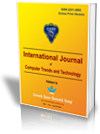Protect Knowledge Retrieval for Localized Disruption Tolerant Military Networks

B. Srihari, K.V.G.N.Naidu, P. Nirupama "Protect Knowledge Retrieval for Localized Disruption Tolerant Military Networks". International Journal of Computer Trends and Technology (IJCTT) V24(3):108-112, June 2015. ISSN:2231-2803. www.ijcttjournal.org. Published by Seventh Sense Research Group.
Abstract -
Mobile nodes in military environments such as a
battlefield or a hostile region are likely to suffer from intermittent
network connectivity and frequent partitions. Disruption-tolerant
network (DTN) technologies are becoming successful solutions that
allow wireless devices carried by soldiers to communicate with each
other and access the confidential information or command reliably
by exploiting external storage nodes. Some of the most challenging
issues in this scenario are the enforcement of authorization policies
and the policies update for secure data retrieval. Cipher text-policy
attribute-based encryption (CP-ABE) is a promising cryptographic
solution to the access control issues. However, the problem of
applying CP-ABE in decentralized DTNs introduces several security
and privacy challenges with regard to the attribute revocation, key
escrow, and coordination of attributes issued from different
authorities. In this paper, we propose a secure data retrieval scheme
using CP-ABE for decentralized DTNs where multiple key authorities
manage their attributes independently. We demonstrate how to apply
the proposed mechanism to securely and efficiently manage the
confidential data distributed in the disruption-tolerant military
network.
References
[1] J. Burgess, B. Gallagher, D. Jensen, and B. N. Levine, “Maxprop: Routing
for vehicle-based disruption tolerant networks,” in Proc. IEEE INFOCOM,
2006, pp. 1–11.
[2] M. Chuah and P. Yang, “Node density-based adaptive routing scheme for
disruption tolerant networks,” in Proc. IEEE MILCOM, 2006, pp. 1–6.
[3] M. M. B. Tariq, M. Ammar, and E. Zequra, “Mesage ferry route design
for sparse ad hoc networks with mobile nodes,” in Proc. ACM MobiHoc,
2006, pp. 37–48.
[4] S. Roy andM. Chuah, “Secure data retrieval based on ciphertext policy
attribute-based encryption (CP-ABE) system for the DTNs,” Lehigh CSE
Tech. Rep., 2009.
[5] M. Chuah and P. Yang, “Performance evaluation of content-based
information retrieval schemes for DTNs,” in Proc. IEEE MILCOM, 2007, pp.
1–7.
[6] J.Saranya , P.Ilango,"Efficient Information Retrieval By Using Multi-
Modality Manifold Ranking Based On Syntactic/Semantic
Measurement"International Journal of Computer Trends and Technology
(IJCTT),V4(9):3311-3315 September Issue 2013
[7] CH.Sivaram Prasad , T.Venu , N.Subhash Chandra, A New Design for
Deduce User Search Results with Feedback Sessions, International Journal of
Computer Trends and Technology (IJCTT) – volume 15 number 2 – Sep 2014
[8] Tariq O. Fadl Elsid, Mirghani. A. Eltahir, "Data Mining: Classification
Techniques of Students’ Database A Case Study of the Nile Valley University,
North Sudan", International Journal of Computer Trends and Technology
(IJCTT) – volume 16 number 5 – Oct 2014
Keywords
Put your keywords here, keywords are separated by
comma.


